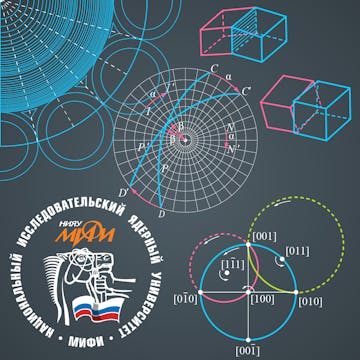
Good to know
Save this course
Activities
Read the textbook: `Crystallography and Crystal Defects` Second Edition
Show steps
Provides a comprehensive overview of the field of crystallography and the study of crystal defects
View
Bulk Metallic Glasses
on Amazon
Show steps
-
Read the first five chapters.
-
Complete the exercises at the end of each chapter.
Organize class materials and notes
Show steps
Improve organization and retention of course material
Show steps
-
Create a system for organizing notes, assignments, and other class materials.
-
Regularly review and update organized materials.
Read `Symmetry in Crystals` by Martin J. Buerger
Show steps
Review foundational knowledge of crystallography and group theory
View
Mineralogy: An Introduction to Minerals, Rocks,...
on Amazon
Show steps
-
Read chapters 1 through 3.
-
Complete the practice problems at the end of each chapter.
Five other activities
Expand to see all activities and additional details
Show all eight activities
Follow online tutorials on crystallography software
Show steps
Gain practical experience using crystallography software
Browse courses on
Crystallography
Show steps
-
Find online tutorials for crystallography software.
-
Follow the tutorials to learn how to use the software.
Form a study group with classmates
Show steps
Collaborate with peers to reinforce concepts and improve understanding
Browse courses on
Crystallography
Show steps
-
Find a group of classmates who are also taking the course.
-
Meet regularly to discuss the course material.
-
Work together on practice problems and assignments.
Solve crystallographic problems
Show steps
Develop problem solving skills and reinforce crystallography concepts
Browse courses on
Crystallography
Show steps
-
Find practice problems online or in textbooks.
-
Solve the problems using the techniques learned in the course.
-
Check your answers against the provided solutions
Help other students with crystallography concepts
Show steps
Reinforce understanding of concepts by explaining them to others
Browse courses on
Crystallography
Show steps
-
Join a study group or online forum.
-
Offer help to other students who are struggling with crystallography concepts.
Create a poster explaining the crystal structure of a material
Show steps
Apply knowledge of crystallography and materials science to create a visual representation of a material's structure
Browse courses on
Crystallography
Show steps
-
Choose a material to investigate.
-
Research the crystal structure of the material.
-
Create a poster that visually represents the crystal structure.
Read the textbook: `Crystallography and Crystal Defects` Second Edition
Show steps
Provides a comprehensive overview of the field of crystallography and the study of crystal defects
View
Bulk Metallic Glasses
on Amazon
Show steps
- Read the first five chapters.
- Complete the exercises at the end of each chapter.
Organize class materials and notes
Show steps
Improve organization and retention of course material
Show steps
- Create a system for organizing notes, assignments, and other class materials.
- Regularly review and update organized materials.
Read `Symmetry in Crystals` by Martin J. Buerger
Show steps
Review foundational knowledge of crystallography and group theory
View
Mineralogy: An Introduction to Minerals, Rocks,...
on Amazon
Show steps
- Read chapters 1 through 3.
- Complete the practice problems at the end of each chapter.
Follow online tutorials on crystallography software
Show steps
Gain practical experience using crystallography software
Browse courses on
Crystallography
Show steps
- Find online tutorials for crystallography software.
- Follow the tutorials to learn how to use the software.
Form a study group with classmates
Show steps
Collaborate with peers to reinforce concepts and improve understanding
Browse courses on
Crystallography
Show steps
- Find a group of classmates who are also taking the course.
- Meet regularly to discuss the course material.
- Work together on practice problems and assignments.
Solve crystallographic problems
Show steps
Develop problem solving skills and reinforce crystallography concepts
Browse courses on
Crystallography
Show steps
- Find practice problems online or in textbooks.
- Solve the problems using the techniques learned in the course.
- Check your answers against the provided solutions
Help other students with crystallography concepts
Show steps
Reinforce understanding of concepts by explaining them to others
Browse courses on
Crystallography
Show steps
- Join a study group or online forum.
- Offer help to other students who are struggling with crystallography concepts.
Create a poster explaining the crystal structure of a material
Show steps
Apply knowledge of crystallography and materials science to create a visual representation of a material's structure
Browse courses on
Crystallography
Show steps
- Choose a material to investigate.
- Research the crystal structure of the material.
- Create a poster that visually represents the crystal structure.
Career center
Crystallographer
Ceramic Engineer
Solid State Physicist
Materials Scientist
Materials Engineer
Metallurgist
Mineralogist
Nanotechnologist
Optical Engineer
Photonics Engineer
Laser Engineer
Solid State Chemist
Geologist
Microscopist
Petrologist
Reading list
Share
Similar courses
OpenCourser helps millions of learners each year. People visit us to learn workspace skills, ace their exams, and nurture their curiosity.
Our extensive catalog contains over 50,000 courses and twice as many books. Browse by search, by topic, or even by career interests. We'll match you to the right resources quickly.
Find this site helpful? Tell a friend about us.
We're supported by our community of learners. When you purchase or subscribe to courses and programs or purchase books, we may earn a commission from our partners.
Your purchases help us maintain our catalog and keep our servers humming without ads.
Thank you for supporting OpenCourser.


